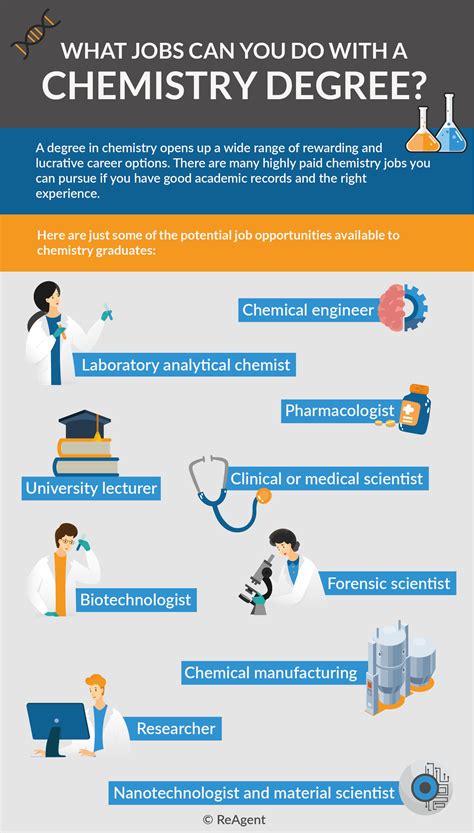Introduction
The field of chemistry offers a vast array of career opportunities for individuals with a bachelor’s degree. From laboratory research to product development, chemistry plays a pivotal role in shaping our lives and advancing scientific knowledge. This article provides an in-depth exploration of the diverse chemistry jobs available to bachelor’s degree holders, highlighting their responsibilities, earning potential, and industry trends.

Roles and Responsibilities
1. Laboratory Technician
- Conduct chemical analyses and experiments
- Prepare and maintain laboratory equipment
- Record and analyze data
- Assist scientists and researchers
2. Analytical Chemist
- Develop and conduct chemical tests to analyze materials
- Identify and quantify components of samples
- Report findings to clients or researchers
3. Environmental Chemist
- Monitor and assess environmental pollution
- Develop and implement strategies to reduce emissions
- Advise government agencies and businesses on environmental regulations
4. Pharmaceutical Chemist
- Discover, develop, and test new drugs
- Design and optimize production processes
- Ensure the safety and efficacy of pharmaceuticals
5. Food Chemist
- Ensure the safety and quality of food products
- Develop new food products and technologies
- Analyze food samples for contaminants
6. Process Chemist
- Design and scale up chemical manufacturing processes
- Optimize production efficiency and reduce costs
- Troubleshoot and resolve technical issues
Industry Trends
The chemistry industry is constantly evolving, driven by technological advancements and increasing demand for sustainable solutions. According to the American Chemical Society, the global chemical industry is projected to reach $5.7 trillion by 2025. This growth presents ample opportunities for qualified chemistry professionals.
Earning Potential
The earning potential for chemistry jobs with a bachelor’s degree varies widely depending on industry, experience, and location. According to the U.S. Bureau of Labor Statistics, the median annual salary for chemists was $82,970 in May 2022. Experienced professionals with advanced degrees can earn significantly higher salaries.
Table: Chemistry Jobs by Industry
| Industry | Median Annual Salary |
|---|---|
| Pharmaceuticals | $101,180 |
| Chemicals | $93,730 |
| Environmental | $85,150 |
| Food | $82,550 |
| Manufacturing | $79,550 |
Table: Chemistry Jobs by Job Title
| Job Title | Median Annual Salary |
|---|---|
| Laboratory Technician | $45,520 |
| Analytical Chemist | $79,680 |
| Environmental Chemist | $82,780 |
| Pharmaceutical Chemist | $90,780 |
| Food Chemist | $77,070 |
| Process Chemist | $92,190 |
Table: Chemistry Jobs by Education Level
| Education Level | Median Annual Salary |
|---|---|
| Bachelor’s Degree | $82,970 |
| Master’s Degree | $97,630 |
| Doctorate | $135,530 |
Strategies for Success
1. Pursue Advanced Education
Obtaining a master’s or doctorate degree can significantly increase your earning potential and career advancement opportunities.
2. Network and Build Connections
Attend industry events, connect with professionals on LinkedIn, and seek out opportunities to collaborate with others.
3. Develop Specialized Skills
Focus on developing expertise in niche areas such as analytical instrumentation, drug discovery, or environmental remediation.
4. Gain Practical Experience
Internships, co-ops, and research projects provide invaluable hands-on experience and make you more competitive in the job market.
Common Mistakes to Avoid
1. Lack of Industry Knowledge
Stay informed about industry trends and developments to demonstrate your knowledge and interest in the field.
2. Poor Communication Skills
Effective communication is crucial in any professional setting. Practice clearly articulating your ideas and findings.
3. Neglecting Research and Innovation
Chemistry is a constantly evolving field. Engage in research projects or participate in ongoing innovation initiatives to stay current.
4. Limiting Your Network
Build a strong network by attending industry events, connecting with professionals on LinkedIn, and seeking out opportunities to collaborate.
5. Lack of Professional Development
Invest in your professional development by attending industry conferences, workshops, and training programs to stay up-to-date on the latest technologies and advancements.
Creating a New Word
To generate ideas for new applications of chemistry, consider coining a new word that captures the essence of the future of the field. For example, “synthetica” could represent the convergence of chemistry, biology, and technology, leading to novel materials and medical advancements.
Step-by-Step Approach to Securing a Chemistry Job
1. Explore Your Options
Research different chemistry jobs and industries to identify your interests and goals.
2. Build Your Skills
Focus on developing strong technical skills, analytical abilities, and communication capabilities.
3. Gain Practical Experience
Secure internships, co-ops, or research projects to demonstrate your practical knowledge and hands-on abilities.
4. Prepare for Interviews
Practice answering common interview questions and showcase your passion for chemistry.
5. Network and Apply
Attend industry events, connect with professionals on LinkedIn, and apply for jobs that align with your qualifications and interests.
Conclusion
Chemistry jobs with a bachelor’s degree offer a wide range of opportunities for professionals to apply their scientific knowledge and make a meaningful impact in various industries. By pursuing advanced education, specializing in niche areas, and embracing a proactive approach, individuals can
